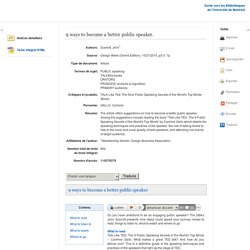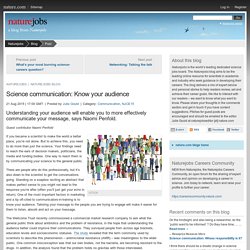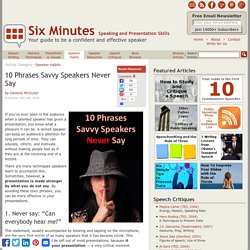

1) Améliorer ses habiletés à l'oral. Do you have ambitions to be an engaging public speaker?

The DBA's John Scarrott presents nine ideas could speed your journey: books to read, things to listen to, what to watch and where to go. What to read Talk Like TED: The 9 Public Speaking Secrets of the World's Top Minds -- Carmine Gallo. What makes a great TED talk? And how do you deliver one? You are the Message: Getting what you want by being who you are -- Roger Ailes. The First 20 Hours: How to learn anything Fast -- Josh Kaufman. Show and Tell: How everybody can make extraordinary presentations -- Dan Roam.
Persuading Aristotle -- Peter Thompson. The 100: Insights and Lessons from 100 of the Greatest Speakers and Speeches ever delivered. What to listen to Talking Books. What to watch Ted Talks. Where to go Attend live events. Instead of listening for content, watch for presentation style and format. You could bring back what you learn to the office and re-present it to your colleagues adding your twist. 2) Connaître son auditoire. Guest contributor Naomi Penfold If you became a scientist to make the world a better place, you’re not alone.

But to achieve this, you need to do more than just the science. Your findings need to reach the ears of decision makers, politicians, the media and funding bodies. One way to reach them is by communicating your science to the general public. There are people who do this professionally, but it’s also down to the scientist to get the conversations going. The Wellcome Trust recently commissioned a commercial market research company to ask what the general public think about antibiotics and the problem of resistance, in the hope that understanding the audience better could improve their communications.
Of particular value in this research was asking how scientists can communicate better, with the result another home-truth of good communication: make it relevant. We scientists are often accused of living in ivory towers. How to understand your audience Make it relevant. 3) Les phrases à éviter. If you’ve ever been in the audience when a talented speaker has given a presentation, you know what a pleasure it can be.

A skilled speaker can keep an audience’s attention for long periods of time. They can educate, inform, and motivate without making people feel as if they are at the receiving end of a lecture. There are many techniques speakers learn to accomplish this. Sometimes, however, a presentation is made stronger by what you do not say. By avoiding these toxic phrases, you can be more effective in your presentations. 1. This statement, usually accompanied by blowing and tapping on the microphone, are the very first words of so many speakers that it has become cliché. Try this instead: Work out audio issues in advance. Verifying that your audio will work as planned is part of the preparation process. There are a few exceptions to this guideline. 2. “Sometimes, however, a presentation is made stronger by what you do not say.” 3. 4) Le silence visuel. 5) Le bonbon de la semaine. 1) 2) 3) 4) 5)